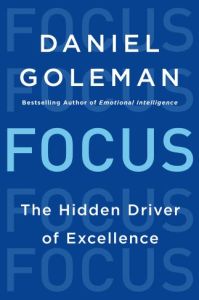Acesse a sua conta getAbstract para obter o resumo!

Acesse a sua conta getAbstract para obter o resumo!
Daniel Goleman
Focus
The Hidden Driver of Excellence
Harper, 2013
Sobre o que é?
Paying attention pays dividends, but most people have to reclaim the ability to focus.
Recommendation
Daniel Goleman, author of the groundbreaking, mid-‘90s classic Emotional Intelligence, turns his attention to the subject of attention – and explains why focus is essential for navigating life, performing at your best, leading others and, ultimately, improving the world for future generations. His illuminating explanations of brain functions will be useful to businesspeople and educators. Ironically, Goleman digresses often, and his efforts to incorporate issues that matter to him – such as climate change and economic inequality – prove confusing. Still, he’s superb at thoughtfully explaining how people think and feel. getAbstract finds that his simple explanations of the workings of the human brain, and his depiction of focus as a triad of attention paid to “inner, other and outer” targets make reading his work more than worthwhile. Goleman compares attention to a muscle you can flex and strengthen. For a buff psyche and enhanced mental tone, try this attention workout.
Summary
About the Author
Science journalist and two-time Pulitzer Prize nominee Daniel Goleman wrote The New York Times bestseller Emotional Intelligence.

























Comment on this summary